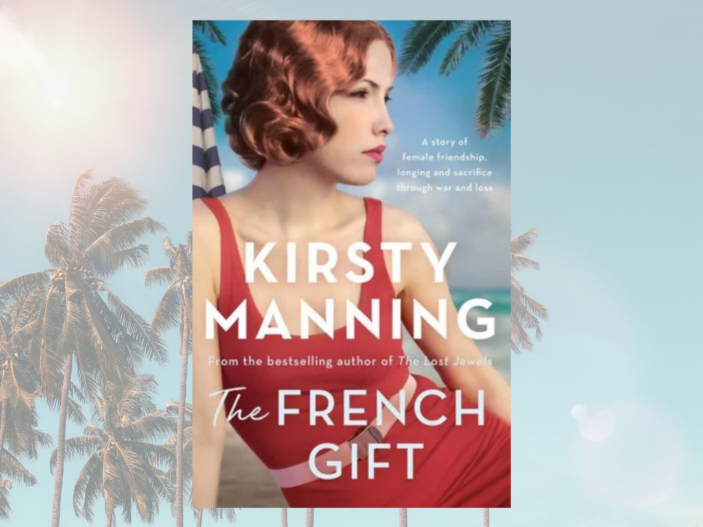
Kirsty Manning‘s historical fiction always features two things: an intriguing mystery in the past that must be uncovered by characters in the present day, and sumptuous descriptions of food and drink. Her latest novel, The French Gift is no exception. And no wonder, as Kirsty Manning is the co-owner of the Bellota Wine Bar and the Prince Wine store, so she knows what she’s talking about.
In The French Gift, readers are transported to present day Cote d’Azur, where a woman named Evie is helping to curate an exhibit about her late husband’s Great-Aunt, celebrated novelist Josephine Murant. Interspersed between chapters tracing Evie’s quest for a missing manuscript, readers bear witness to two historical points of view. One is that of Josephine Murant herself, imprisoned for her pro-de Gaulle resistance activities in Nazi occupied France. The other is that of Margot Bisset, who has been wrongfully imprisoned (or so she says) for the murder of an American heiress. The friendship between these two women will sustain them throughout their prison sentences at Fresnes, and as they are transported to the horrors of a forced labour camp at the Phrix Rayon Factory in Germany. The story of their friendship may just inspire Evie herself to carry on.
Inspired by the story of Agnes Humbert, The French Gift takes its place among the slew of historical fiction being released that celebrates the untold stories of women at war. It holds its own against stories like Natasha Lester‘s The French Photographer and Ariel Lawhon‘s Code Name Helene; blending decadent 1930’s elegance and the horrors of the 1940’s with a modern day storyline highlighting the ongoing importance of learning history.
The French Gift is Manning’s fourth foray into this genre, and firmly establishes her as one of its stalwarts. It is a novel which is both comfortingly familiar, and just original and exciting enough to be difficult to put down. Her characters are richly drawn and inspiring, and the level of detail included about Evie’s professional life as a botanical illustrator add an extra layer to the novel. I also enjoyed the simplicity and lack of angst in her developing relationship with the museum curator and documentarian whose interest in Josephine kicks the whole story off.
This book is noticeably shorter than Manning’s three previous books, and my biggest criticism is that I would have loved to have had more of it. Compared to other books by Manning (and other books in this genre) at times The French Gift gives the impression of holding back. Scenes jump along quickly, and the historical elements of the book cover a matter of six years in about three hundred pages, though half of these are devoted to the present day.
Manning acknowledges in her author’s note that though this book was written at the kitchen table during 2020, it is not a ‘pandemic’ book. And in fact, while her chapter headings simply say ‘present day’, Evie and her story take place during a 2020 where COVID has not had the impact that it has had in reality. Thank goodness! While one day, readers might take to storylines that explore the impacts of the past eighteen months, now would definitely be too soon, and to compare the current situation with occupied France might be a tricky task to pull off well.
It’s hard to talk about twists in books without giving spoilers, so suffice to say that there is one, and it’s very satisfying. Although if you’re an avid historical fiction reader like myself you may have encountered it before and see it coming.
If you have loved Kirsty Manning’s previous books, or if you’re a fan of Natasha Lester, then this book is for you. Make sure you have a steady supply of wine on hand, and clear your schedule, because this is a novel that you won’t want to stop reading until you’ve finished it.
![]()
![]()
![]()
![]()
![]()
FOUR STARS (OUT OF FIVE)
The French Gift by Kirsty Manning is out now, from Allen and Unwin. Grab yourself a copy from Booktopia HERE.
